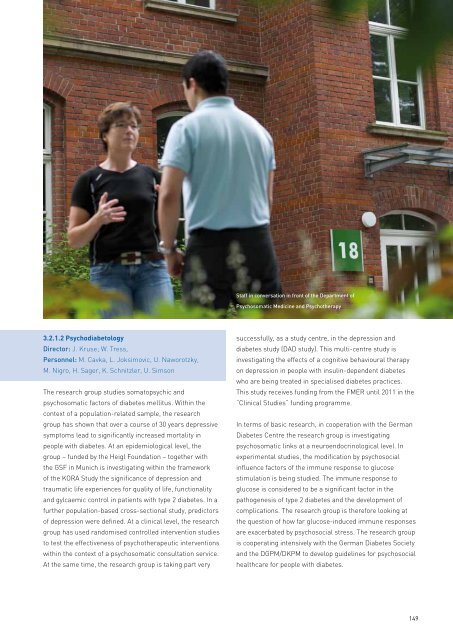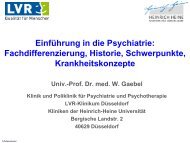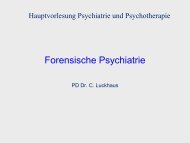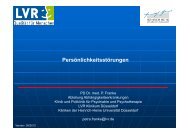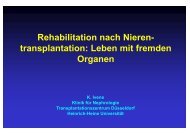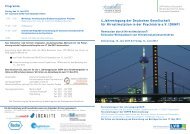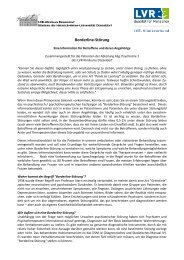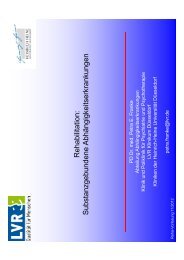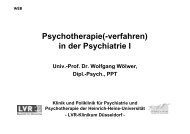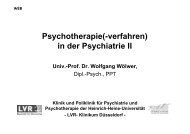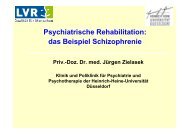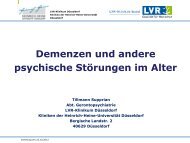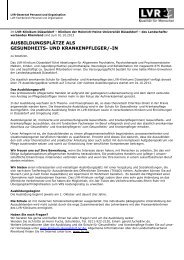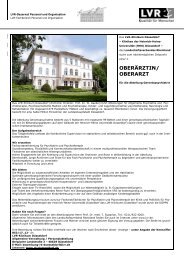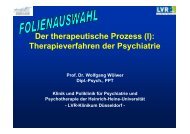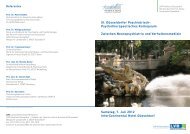LVR-Klinikum Düsseldorf Hospital of the Heinrich-Heine University ...
LVR-Klinikum Düsseldorf Hospital of the Heinrich-Heine University ...
LVR-Klinikum Düsseldorf Hospital of the Heinrich-Heine University ...
Create successful ePaper yourself
Turn your PDF publications into a flip-book with our unique Google optimized e-Paper software.
3.2.1.2 Psychodiabetology<br />
Director: J. Kruse; W. Tress,<br />
Personnel: M. Cavka, L. Joksimovic, U. Naworotzky,<br />
M. Nigro, H. Sager, K. Schnitzler, U. Simson<br />
The research group studies somatopsychic and<br />
psychosomatic factors <strong>of</strong> diabetes mellitus. Within <strong>the</strong><br />
context <strong>of</strong> a population-related sample, <strong>the</strong> research<br />
group has shown that over a course <strong>of</strong> 30 years depressive<br />
symptoms lead to significantly increased mortality in<br />
people with diabetes. At an epidemiological level, <strong>the</strong><br />
group – funded by <strong>the</strong> Heigl Foundation – toge<strong>the</strong>r with<br />
<strong>the</strong> GSF in Munich is investigating within <strong>the</strong> framework<br />
<strong>of</strong> <strong>the</strong> KORA Study <strong>the</strong> significance <strong>of</strong> depression and<br />
traumatic life experiences for quality <strong>of</strong> life, functionality<br />
and gylcaemic control in patients with type 2 diabetes. In a<br />
fur<strong>the</strong>r population-based cross-sectional study, predictors<br />
<strong>of</strong> depression were defined. At a clinical level, <strong>the</strong> research<br />
group has used randomised controlled intervention studies<br />
to test <strong>the</strong> effectiveness <strong>of</strong> psycho<strong>the</strong>rapeutic interventions<br />
within <strong>the</strong> context <strong>of</strong> a psychosomatic consultation service.<br />
At <strong>the</strong> same time, <strong>the</strong> research group is taking part very<br />
Staff in conversation in front <strong>of</strong> <strong>the</strong> Department <strong>of</strong><br />
Psychosomatic Medicine and Psycho<strong>the</strong>rapy<br />
ReseaRch<br />
successfully, as a study centre, in <strong>the</strong> depression and<br />
diabetes study (DAD study). This multi-centre study is<br />
investigating <strong>the</strong> effects <strong>of</strong> a cognitive behavioural <strong>the</strong>rapy<br />
on depression in people with insulin-dependent diabetes<br />
who are being treated in specialised diabetes practices.<br />
This study receives funding from <strong>the</strong> FMER until 2011 in <strong>the</strong><br />
“Clinical Studies” funding programme.<br />
In terms <strong>of</strong> basic research, in cooperation with <strong>the</strong> German<br />
Diabetes Centre <strong>the</strong> research group is investigating<br />
psychosomatic links at a neuroendocrinological level. In<br />
experimental studies, <strong>the</strong> modification by psychosocial<br />
influence factors <strong>of</strong> <strong>the</strong> immune response to glucose<br />
stimulation is being studied. The immune response to<br />
glucose is considered to be a significant factor in <strong>the</strong><br />
pathogenesis <strong>of</strong> type 2 diabetes and <strong>the</strong> development <strong>of</strong><br />
complications. The research group is <strong>the</strong>refore looking at<br />
<strong>the</strong> question <strong>of</strong> how far glucose-induced immune responses<br />
are exacerbated by psychosocial stress. The research group<br />
is cooperating intensively with <strong>the</strong> German Diabetes Society<br />
and <strong>the</strong> DGPM/DKPM to develop guidelines for psychosocial<br />
healthcare for people with diabetes.<br />
149


